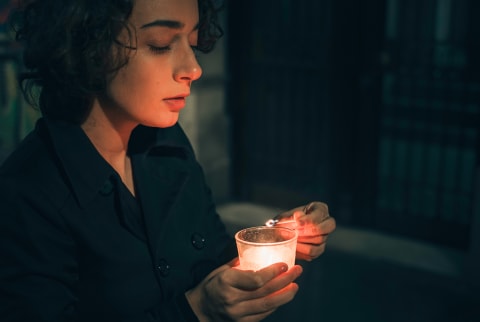Advertisement
How To Cope With Intense Emotions Amid The 20th Anniversary Of 9/11


Around the 20th anniversary of September 11th, it's natural to feel a flood of emotions. I'll admit that even as a clinical psychologist, the feelings for an intense event like this can be overwhelming.
To cope at times like this, I turn to a strategy that blends perspectives from my yoga background as well as my psychology training in a system I call C.A.R.E.—which stands for consider, act, reflect, and ease. It's designed to promote awareness of feelings and help identify appropriate, healthy action.
Intense, powerful emotions often arise when we feel injustice or other trauma has occurred. Taking appropriate action often helps soothe our emotions by creating a sense of reassurance that we are not helpless and that our choices can make a difference to ourselves as well as others. The C.A.R.E. system is applicable to any situation where something shocking has happened, but I'll use September 11th as the example here.
Consider.
Take some time to just observe what has happened and how you feel about it. This is often easier said than done: With traumatic events, we sometimes struggle to put words on the experience because it can feel so intense. One way to do this is by journaling a few simple sentences about exactly what happened as if you were a newspaper reporter. Next, challenge yourself to write down three to five emotions the event evokes for you. If you feel stuck, consider looking at an emotional vocabulary stimulator—I have a few good ones posted for free on my website.
Act.
A healthy function of emotions is often to stimulate action—and taking appropriate action can often help soothe emotions.
For example, if you feel heartache for the families of victims, you could donate your money or time to support them. There are some great ways to do this through the 9/11 Memorial Museum in New York City. Even if you don't live nearby, you can still donate (even small donations help!) or plan to participate in their annual nationwide run/walk fundraiser or find nationwide volunteer opportunities through the nonprofit 9/11 Day foundation.
If you can't connect specifically with a 9/11 charity, volunteering to help those in need (even if their need isn't specifically related to 9/11) is often a healthy way to take action around feelings for victims.
If you feel anger, healthy actions could include political activism or working to raise awareness and spotlight the issue. These are just examples, of course. Each of us will have different emotions, and the best action is a personal choice.
Reflect.
Once you have taken action, pause to reflect on how this has affected the way you feel. Your emotions will still be there, of course—but hopefully, they'll now be balanced by a sense of empowerment since you were willing and able to take action about the issue.
You may find that while it felt good to help, you sense that your work isn't done: Perhaps this awareness is guiding you to return to the "Act" step and make plans to do it again next year, volunteer more frequently, or take other actions.
The "Reflect" step is often aided by talking with friends or family about your feelings and the action you took, though many people also prefer to reflect in private by journaling or listening to relaxing music.
Ease.
Once you've considered, acted, and reflected, it can be helpful to consciously give yourself permission to ease into focusing on other parts of your life. Remember that self-care is an important part of keeping yourself mentally strong and helping you show up as a resource for others.
This means that spending time with friends, going to the gym, relaxing with a movie, or any other "me time" activity could help you be a good community member, too. It may help to intentionally recognize this and give yourself permission to move forward with your day as you complete the C.A.R.E. process. You can always return to repeat the process if you want, but sometimes it's helpful to remember that taking a step back to care for yourself is an important step, too.
The takeaway.
I hope you have found my C.A.R.E. system helpful. Remember, it's totally natural and healthy to have strong emotions about big events. You don't have to go through it alone. This is a good time to lean on friends and family, try self-help books or podcasts, get involved with a fitness class that helps you relax and find community, or even consider a therapist if you feel the need for more tailored support. As a clinical psychologist and former yoga teacher, I know there are many ways to practice self-care. I encourage you to take whatever steps are best for you!
To watch a short video of me walking you through the C.A.R.E. steps, and applying them to other world events, see my blog on this topic!